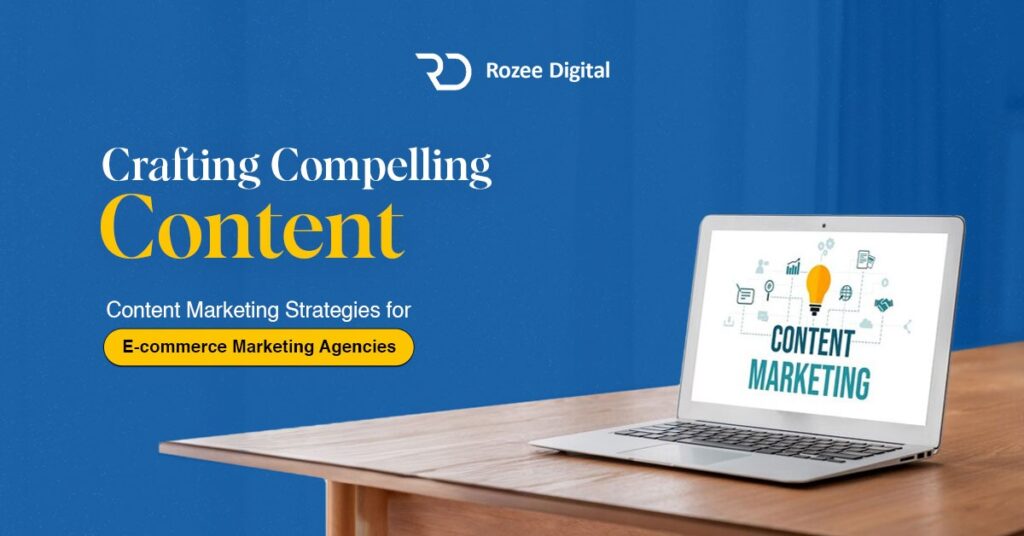Discover the best content marketing strategies designed specifically for e-commerce marketing agencies to engage and convert their audience effectively.
Competition is becoming increasingly intense, and as a result, content is emerging as the primary ingredient for the success of any e-commerce marketing agency. A good e-commerce content marketing strategy can make or break your success game. So, crafting compelling content is pivotal for e-commerce marketing agencies looking to carve a niche in the bustling digital marketplace. In an era where consumers are inundated with choices and information, your content not only needs to stand out but also deliver value, driving meaningful engagement and conversions. Below are strategic insights and tips for e-commerce marketing agencies to craft content that can elevate your e-commerce marketing efforts.
Understanding The Basics
What is Content Marketing?
Content marketing entails an inbound digital marketing approach that aims to attract potential customers to you. Achieving this involves providing them with high-quality content wherever they seek answers—be it on search engines, product review sites, social media platforms, and more.
The objective of an e-commerce content marketing campaign isn’t to aggressively promote or sell services or products to potential customers. Instead, it aims to educate, inform, entertain, and engage them through valuable and pertinent content.
Consistently delivering valuable content to your target audience can significantly enhance customer loyalty, organic traffic, conversions, and customer retention. The widespread adoption of this marketing form, with 82% of marketers actively employing it today, underscores its effectiveness.
What is Content Marketing for E-commerce?
The e-commerce sector is characterized by its vastness and competitiveness. Businesses must navigate through the noise to reach their target audience, by making content creation for e-commerce and understanding the landscape a prerequisite for success.
Content marketing for e-commerce refers to the strategic use of content creation and distribution to attract, engage, and retain customers through various digital channels for e-commerce businesses. It involves producing and sharing relevant, valuable, and high-quality content that resonates with the target audience to drive traffic, increase brand awareness, and ultimately, boost sales and conversions on e-commerce platforms.
E-commerce content marketing aims to:
- Respond to customer queries,
- Offer valuable insights,
- Establish brand credibility, and
- Promote an interactive online shopping experience.
It motivates site visitors to complete purchases and transform into loyal, returning customers.
Want to Boost your brand’s conversion rate with expert advertising services? Let’s skyrocket your business growth together. Contact Rozee Digital today to maximize your advertising ROI and drive real results. Don’t miss out on this opportunity – reach out now and let’s elevate your brand’s success!
Why Content Marketing is Key for E-commerce Success
The commencement of diverse businesses is driven by an overarching purpose. For an e-commerce website, this purpose is primarily centered around the best content strategy to achieve sales and generate revenue. Similarly, in the realm of commencement speeches, the ultimate objective is to deliver a successful and impactful address, akin to achieving ‘sales’ or ‘revenue’ in the context of an e-commerce website.
You might ask, “Why is Content Marketing Essential for E-commerce Websites?” In response, I offer a quote by Andrew Davis –
“Content builds relationships. Relationships are built on trust. Trust drives revenue.”
Now that we understand the fundamental importance of content marketing for e-commerce, let’s delve deeper into the data and statistics that underscore the necessity for eCommerce content creation and its marketing efforts.
Based on recent data:
In 2022, content marketing generated revenues totaling $63 billion. Projections indicate a promising growth trajectory, with the industry expected to reach $107 billion by 2026.
The global expansion of internet access is accelerating. By October 2023, estimates suggest there were 5.3 billion internet users globally, with approximately 4.95 billion actively participating on social media platforms.
This rapid increase in online connectivity has had a profound impact on retail e-commerce, with third-party logistics (3PL) solutions playing a pivotal role in operations. In 2022, global retail e-commerce sales surpassed $5.7 trillion. Forecasts project a substantial 56% growth, potentially reaching approximately $8.1 trillion by 2026.
The combination of informative and engaging content alongside real-time data creates a formidable marketing strategy. E-commerce enterprises that adeptly employ content marketing are not just viewed as sellers but also as credible sources of information, setting them apart in the competitive online landscape.
Thus, investing in content creation for e-commerce represents not merely a transient trend but a strategic business imperative, as evidenced by notable enhancements in customer engagement and sales metrics.
This importance does not end here…
Content marketing stands out as a non-intrusive way to engage potential customers, offering them value beyond just a sales pitch. It’s an approach that builds trust, establishes brand authority, and supports various stages of the customer journey. It is crucial for e-commerce marketing agencies for several reasons:
- Builds Trust and Credibility
Providing valuable, relevant content helps build trust with potential customers. This trust is essential for establishing credibility in the e-commerce space, where competition is fierce and customer loyalty is hard-earned.
- Enhances SEO and Online Visibility
Content marketing significantly contributes to search engine optimization (SEO). By creating high-quality, keyword-rich content, e-commerce businesses can improve their search rankings, leading to increased visibility and traffic to their website.
- Supports Customer Decision-Making
E-commerce shoppers often research products and services online before making a purchase. Informative content that addresses their questions and concerns can guide them through the buying process, positively influencing their decision-making.
- Facilitates Personalized Engagement
Content marketing allows for personalized engagement with potential and existing customers. By leveraging data and insights, e-commerce marketing agencies can tailor their content to meet the specific interests and needs of their audience, enhancing the customer experience and fostering loyalty.
- Drives Conversions and Sales
Effective content marketing can lead directly to increased conversions and sales. Engaging and persuasive content can motivate potential customers to take action, such as making a purchase or signing up for a newsletter, contributing to the overall success of the e-commerce business.
- Supports Various Stages of the Buyer’s Journey
Content marketing supports the buyer’s journey from awareness to consideration and decision. By providing content that educates, informs, and entertains at each stage, e-commerce marketing agencies can nurture leads and move them closer to making a purchase.
- Cost-Effective Marketing Strategy
Compared to traditional advertising, content marketing is a cost-effective strategy that offers a high ROI. Quality content continues to attract and engage customers long after it has been published, providing ongoing benefits without the need for continuous investment.
Supercharge your e-commerce brand’s conversion rate with Rozee Digital’s advertising expertise! Contact us today to elevate your success results.
Content Marketing Strategies that every Ecommerce Marketing Agency needs
A successful e-commerce content marketing strategy prioritizes addressing the needs of your target audience — their main challenges, worries, and inquiries. The objective is to fulfill these requirements with engaging content delivered in formats and through channels preferred by your audience.
The choice of content format — whether an eBook, downloadable guide, social media post, guest post, blog post, or product buying guide — will mainly depend on your business objectives. For instance, you might opt for blog content to enhance brand recognition, increase referral or organic traffic, or enhance conversions and customer retention.
In addition to preventing confusion and maintaining brand alignment with its target audience, a consistent content strategy for e-commerce gradually provides value. Without a consistent strategy, your messaging risks being ineffective and possibly contradictory, resulting in communication that falls on deaf ears with no discernible outcomes.
Keeping these considerations in mind, let’s explore some of the most impactful content strategies that B2C marketers should leverage for effective eCommerce content marketing.
1. Understanding Your Audience
Understanding your audience starts with comprehensive buyer persona development. Dive deep into not only the demographics but also the psychographics of your audience, including their challenges, aspirations, and the journey they undergo from awareness to purchase. This understanding shapes not only the content you produce but also how you customize it to resonate on a personal level. Watch USA online porn https://mat6tube.com teens, milfs, matures!
Additionally, mapping out the customer journey is crucial. Identify key stages such as Awareness, Consideration, and Decision, and tailor content to address the specific needs and inquiries at each step. This targeted strategy guarantees that your content remains relevant and compelling throughout the entire sales funnel.
2. Leverage User-Generated Content (UGC)
User-generated content (UGC) includes any content produced by customers that pertains to your e-commerce venture, either directly or indirectly. This may encompass testimonials, reviews, social media engagements, or images showcasing purchased products being used in everyday situations.
Encourage customers to share their experiences with products through reviews, photos, and videos. This authentic content can be used across social media platforms, product pages, and marketing campaigns, fostering trust and community.
In e-commerce content marketing strategies employing UGC, customer-created content is integrated into promotional materials like email newsletters or sponsored campaigns. This integration occurs with the author’s consent and aims to cultivate a connection between potential buyers and an authentic brand image.
3. Create Comprehensive Buying Guides
Developing comprehensive buying guides involves crafting detailed resources for products or services, and providing insights into their features, benefits, and comparisons. These guides serve to empower customers with the information needed to make informed purchasing decisions.
Additionally, they contribute to improving SEO rankings by incorporating targeted keywords and offering valuable content that addresses customer needs and queries.
4. Utilize Influencer Collaborations
Partner with influencers who resonate with your target audience to create content that promotes products genuinely and appealingly. Influencer collaborations can expand your reach and lend credibility to your offerings.
Forge partnerships with influential individuals in your target market to promote your products. These influencers have the sway to influence their audience’s purchasing decisions due to their authority or relationship with followers. Consider tools like AspireIQ or Upfluence for managing partnerships, and tracking campaign performance using Google Analytics.
For example, e-commerce brands like beauty brands often collaborate with makeup artists or beauty vloggers for tutorials. Choose influencers aligned with your brand, prioritize engagement over follower count, set clear goals, and grant creative freedom for authentic content. Well-executed collaborations extend your brand’s reach and resonate with new audiences, leveraging trusted voices to endorse your products.
5. Offer Value through Educational Content
Produce educational content such as how-to guides, tutorials, and webinars aimed at providing valuable insights and knowledge to your audience. By positioning your brand as a helpful resource, you can foster increased customer loyalty and trust.
Educational content serves to empower your audience, addressing their pain points and offering solutions, thereby establishing your brand as a trusted authority in the industry.
6. Implement Interactive Content
Engage users with interactive content formats such as quizzes, polls, interactive videos, and augmented reality experiences. Interactive content not only captivates audiences but also collects valuable data on user preferences and behaviors.
By providing personalized experiences, interactive content enhances user engagement and encourages active participation, ultimately driving conversions and brand loyalty.
7. Focus on Storytelling
Storytelling serves as a potent strategy within e-commerce content marketing, enabling you to cultivate appeal. It captivates audiences by providing them with a profound insight into the essence of your brand’s identity.
Craft compelling narratives around your products, brand values, and customer experiences. Storytelling has the power to evoke emotions, create authentic connections, and differentiate your brand from competitors. By weaving narratives that resonate with your audience, you can make your content more memorable and impactful, fostering deeper relationships with customers and driving brand advocacy.
8. Leverage Email Marketing
Develop targeted and personalized email marketing campaigns designed to nurture leads and maintain your brand’s presence in the minds of your audience. Incorporate engaging content that addresses customer needs, interests, and pain points.
By delivering relevant and valuable content directly to their inbox, you can drive engagement, encourage action, and ultimately drive conversions.
9. Create Visually Appealing Content
Invest in high-quality images, videos, and graphics to make your content more engaging. Visual content is more likely to be shared and can significantly increase the attractiveness of your offerings.
Visually appealing content forms the foundation of captivating e-commerce websites, transforming ordinary browsing into an immersive journey. It goes beyond mere high-quality images, striving to craft a visual narrative that seamlessly aligns with your brand and products. This entails utilizing tools like Adobe Photoshop and Canva to create compelling visuals that resonate with your audience.
Fashion retailers, for instance, leverage visually rich galleries to showcase their apparel, curating images that evoke specific moods or aesthetics. Quick tips include ensuring a high resolution, maintaining brand-consistent styles, employing diverse formats, and integrating user-generated content for authenticity. By prioritizing visually appealing content, you not only capture attention but also facilitate customers’ deeper understanding of your products, fostering confidence in their purchase decisions.
10. SEO Optimization for E-commerce Content
SEO, short for Search Engine Optimization, is the key factor that ensures your content’s visibility and appeals to search engines such as Google. Without it, your valuable content may remain unnoticed by potential customers, regardless of its quality.
By implementing SEO strategies, you effectively steer search engines toward your content, increasing the likelihood of appearing on the coveted first page, where the majority of users tend to click.
Consider this:
- In the absence of SEO, your content might not get properly indexed and ranked, resulting in reduced traffic.
- Competitors who prioritize SEO are likely to surpass you in search engine rankings, capturing a significant portion of the market share.
- Neglecting SEO means forfeiting the opportunity to target specific audiences through relevant keywords.
- Incorporating SEO into your content strategy is not an overwhelming endeavor.
- Begin by conducting keyword research to grasp what your target audience is searching for.
- Strategically incorporate these keywords into your content, titles, and meta descriptions.
- Ensure your website offers a user-friendly experience and is optimized for mobile devices, as search engines favor sites that prioritize user experience.
The goal is to enhance visibility, drive traffic, and ultimately convert that traffic into loyal customers. So, before you publish your next piece of content, remember: that a touch of SEO can make a significant impact!
11. Analyze and Adapt
Use analytics tools to track the performance of your commerce content. Look beyond just views or likes; analyze engagement metrics, conversion rates, and SEO rankings to gauge effectiveness. Use these insights to refine your strategy, experimenting and adapting to what resonates best with your audience.Maximize your conversion rate with Rozee Digital’s advertising services. We are ready to elevate your brand’s success – contact us today!
FAQ’s
What is content marketing in the context of e-commerce?
Content marketing for e-commerce involves creating and sharing valuable, relevant, and consistent content to attract and retain a clearly defined audience. The ultimate goal is to drive profitable customer action by building trust, educating, and engaging potential buyers throughout their purchasing journey.
How can e-commerce businesses benefit from content marketing?
E-commerce businesses benefit from content marketing by establishing authority, building trust with their audience, and improving brand awareness. Effective content marketing strategies can also enhance SEO, drive traffic to the website, encourage customer engagement, and ultimately increase sales and customer loyalty.
What types of content are most effective for e-commerce marketing?
Effective content types for e-commerce include product demos, tutorials, customer testimonials, engaging blog posts, interactive videos, infographics, and user-generated content such as customer reviews and social media posts. The key is to create content that provides value, answers questions, and solves problems for the target audience.
How important is SEO for e-commerce content marketing?
SEO is crucial for e-commerce content marketing as it helps ensure that the content reaches its intended audience through organic search. Optimizing content with relevant keywords, meta descriptions, alt text for images, and quality backlinks improves visibility in search engine results pages (SERPs), driving more traffic to the e-commerce site.
Can social media platforms be used for e-commerce content marketing?
Absolutely! Social media platforms are powerful tools for e-commerce content marketing, allowing businesses to reach a broader audience, engage with customers, and drive traffic to their websites. Platforms like Instagram, Facebook, Pinterest, and Twitter enable e-commerce brands to showcase their products, share engaging content, and leverage influencer partnerships.
What role does analytics play in content marketing for e-commerce?
Analytics are vital in content marketing for e-commerce as they provide insights into content performance, audience behavior, and campaign effectiveness. By analyzing metrics such as engagement rates, conversion rates, and website traffic, e-commerce marketers can refine their content strategy, improve content quality, and make data-driven decisions to achieve better results.
Conclusion
Crafting compelling content and implementing strategic content marketing approaches are vital for e-commerce marketing agencies aiming to thrive in the digital age. By understanding your audience, leveraging various content types, and continuously optimizing your strategies based on analytics, you can significantly enhance your online presence and drive conversions. Remember, the key to successful e-commerce content marketing lies in offering value, building relationships, and maintaining a dynamic and responsive marketing approach.
Following the tips for e-commerce compelling content is pivotal for e-commerce marketing agencies looking to carve a niche in the bustling digital marketplace. In an era where consumers are inundated with choices and information, your content not only needs to stand out but also deliver value, driving meaningful engagement and conversions.




